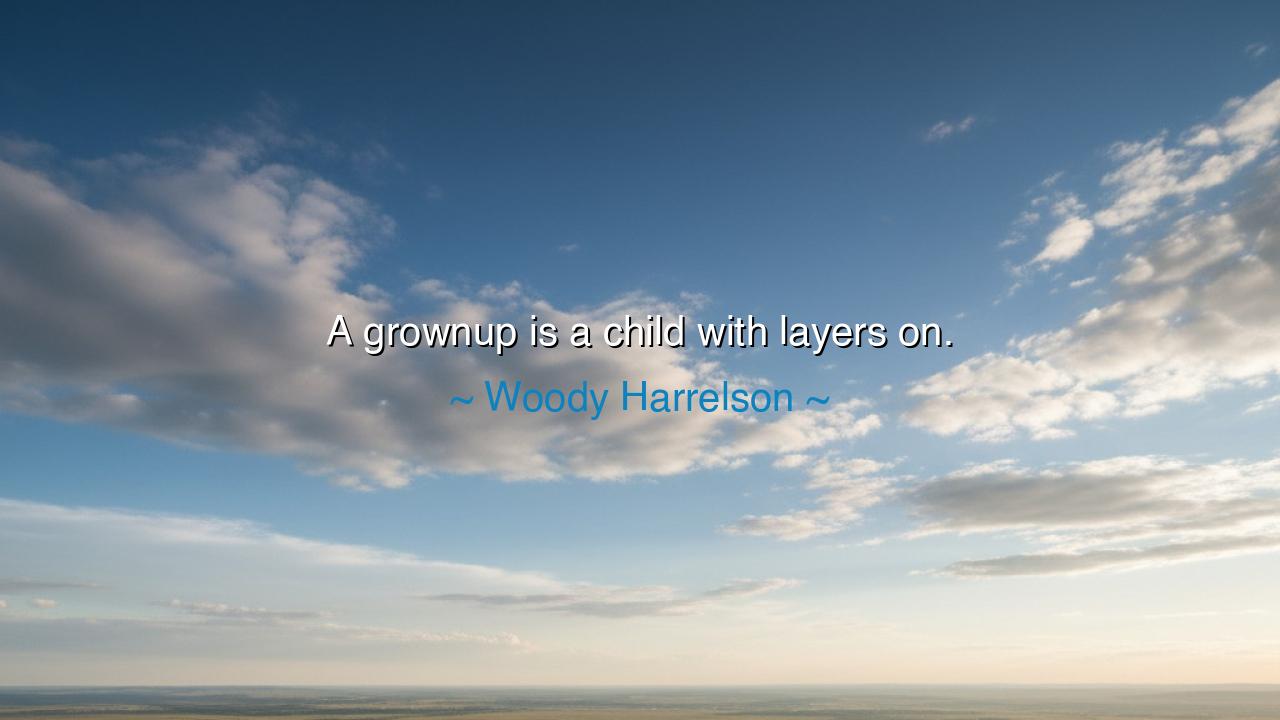
A grownup is a child with layers on.






Listen, O children of wisdom, to the words of Woody Harrelson, whose truth speaks deeply of the human condition: “A grownup is a child with layers on.” In these words lies a revelation about the journey from youth to adulthood, a journey not of transformation into something entirely new, but a journey of adding layers—layers of experience, of responsibility, of the world's expectations. Harrelson invites us to see that beneath the layers of age, experience, and social role, we remain the same child—curious, seeking, dreaming, and feeling the world with the same vulnerability we did in our earliest years. The child is never fully gone; it is merely concealed by the weight of life's burdens and pretense.
In the ancient world, the philosophers spoke often of the duality within human beings—the child that remains even as we grow older. Socrates, wise in his years, was a man who spent his life questioning the world around him, seeking the truth with the innocence of a child. Though he lived among the great minds of Athens, Socrates never abandoned the childlike curiosity that led him to ask profound questions about life, justice, and the nature of the soul. For Socrates, age was not a shedding of the child within, but the refinement of that spirit. He was, in many ways, a grownup with layers—a man who, though aged and wise, never ceased to approach the world with the wonder of a child. The child within him never died, it only became enriched by the wisdom of his experiences.
Plato, the student of Socrates, also understood this truth. His writings reflect a mind that sought the truths of the universe, but beneath that intellectual pursuit was the unshakable innocence of someone who believed in the inherent goodness and curiosity of humanity. Even as he wrote about the ideal state and the nature of virtue, Plato’s work was driven by an underlying belief in the child's wonder—the desire to understand the world in its purest form. To Plato, growing up did not mean abandoning the child, but learning to use that same imaginative energy and innocence to see deeper, more complex truths. His adult wisdom was, in many ways, merely a layer over the innocent and curious child he had once been.
But not all are able to carry the child's spirit into adulthood with such grace. As we grow older, the world places burdens upon us—responsibility, duty, the need to compromise. The layers of expectation and society’s demands often bury the free-spirited nature we once had. Take, for example, the life of Michelangelo, whose later years, though filled with profound artistic achievement, were marked by the struggles of living in an ever-demanding world. Michelangelo, much like many of us, was forced to wear the layers of public expectations and personal sacrifice. Yet, even in his later works, one can still see the child’s wonder in the way he sculpted the human form, his work filled with the innocence of someone who saw beauty in truth and creativity. Even with all the burdens of fame and age, Michelangelo retained the essence of a child's wonder through his art.
Harrelson’s words remind us that we, too, carry the child within us, even as we face the complexities of adult life. The child is the source of our joy, our imagination, and our resilience. It is the part of us that dreams without limitation, that loves without hesitation, and that seeks with curiosity. The tragedy of adulthood is not that we must grow older, but that we sometimes forget to keep that child alive. We often bury the joys of youth beneath the layers of responsibility, forgetting that the innocence and wonder of the child are what give our lives meaning. Harrelson’s words serve as a reminder that the child does not need to be abandoned but can be woven into our adult lives, not as a weakness, but as a source of strength.
The lesson here is simple: embrace the child within you, even as you grow older. Allow yourself to remain curious, to dream, and to wonder in the way a child does. The layers of life may come, but they need not bury the joy, innocence, and freedom of the soul. Acknowledge that to grow older does not mean to lose the essence of the child, but rather to nurture it with the wisdom, understanding, and love that comes with age. The adult is but the child enriched by experience, wisdom, and the maturity that life bestows.
In your own life, reconnect with the child within. Let yourself be playful, curious, and unafraid to embrace the world with the same freshness you once had. Live with the sense of wonder and joy that the child brings, for it is this spirit that will carry you through the challenges of adulthood. When the layers of responsibility weigh heavily, remember that the child’s heart is always with you, waiting to remind you of the simple beauty of life.






AAdministratorAdministrator
Welcome, honored guests. Please leave a comment, we will respond soon